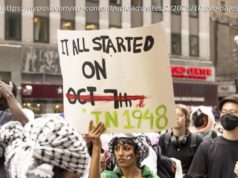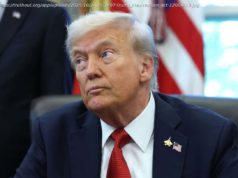Removing a hold on President Trump ’s travel moratorium would “unleash chaos again” and hurt business and universities, two states told a federal appeals court Monday.
In written arguments , lawyers for the states of Washington and Minnesota said a temporary hold on Trump’s executive order banning travel from seven predominantly Muslim nations should remain in place until a lower court determines whether the order was unconstitutional.
After a district judge in Washington put a hold on Trump’s directive, the Trump administration asked the 9th U. S. Circuit Court of Appeals to remove it. The court will issue a decision after receiving arguments from the Trump administration later this afternoon.
The state of Washington citied a litany of problems caused by the order. More than 7,000 non-citizen immigrants from the affected countries live in Washington, the state told the appeals court.
“Those who were abroad were blocked from returning home,” the states argued. “Husbands were separated from wives, brothers from sisters, and parents from their children. Some who had waited decades to see family members had that reunion taken away without warning or reason.”
Nearly 100 businesses, including well-known technology firms like Apple, Google, Twitter and Uber, filed arguments supporting the states’ case.
The companies argued the ban was disruptive, making it more difficult for them to recruit and retain employees and threatening their ability to attract talent, business, and investment to the United States.
A number of former national security and intelligence officials—including former secretaries of state John Kerry and Madeleine Albright , former defense secretary and CIA director Leon Panetta , and ex-national security advisor Susan Rice —also sided with the states.
In a declaration , they argued that the order “could do long-term damage to our national security and foreign policy interests, endangering U. S. troops in the field and disrupting counter-terrorism and national security partnerships.”
Trump’s Jan. 27 order, which he said was designed to help the country block potential terrorists, suspended entry from Syria, Iraq, Yemen, Iran, Sudan, Somalia and Iran—prompting chaos at airports and protests around the world.
It also suspended new refugee settlements in the U. S., targeting Syrian refugees with indefinite suspension.
Several courts across the country have ruled against portions of the ban, but U. S. District Judge James Robart in Seattle on Friday imposed a temporary restraining order setting aside enforcement of its key provisions nationwide, pending a full legal review.
The Justice Department is asking the appeals court to stay that order, and Monday’s brief from the states argues against that.
The states in their brief filed early Monday contended the order hurt Washington’s economy by reducing sales tax revenues from travelers and depriving major tech companies of the work of skilled immigrants.
Hundreds of faculty, staff and students from Washington’s public university also suffered, the states contended. Some were immediately stranded overseas, and others have been unable to travel for research, according to the states.
“Staying the district court’s ruling would re-institute those harms, separating families, stranding our university students and faculty, and barring travel,” the states argued.
The states said that the 9th Circuit should not permit constitutional violations of due process and the free exercise of religion based on the Trump administration’s “unsupported invocation of national security.”
While Trump’s order remains under review by the lower court, “refugees and immigrants from the banned countries will continue to undergo the rigorous screening processes that already existed prior to the order,” the states told the appeals court.
The 9th Circuit refused over the weekend to lift the temporary block on Trump’s travel ban until considering more arguments.
The state of Hawaii, in a request to intervene, also argued the ban would hurt tourism and reduce tax revenues.
In appealing the hold on the executive order, lawyers for the government argued that Washington state lacked standing—or authority—to challenge Trump’s moratorium.
The Trump administration also argued that the hold on the order usurped the authority of the executive branch and second-guessed “the President’s national security judgment.”
The President, the lawyers argued, has clear authority to decide whether national security makes it necessary to bar certain people from entering the country.
Trump’s lawyers further contended that the harms the states said stemmed from the travel were merely speculative.
Ali Vayeghan was one of an unknown number of people whose plans were disrupted by President Trump’s entry ban. UC Berkeley was home of the free speech movement. Today, California’s flagship university is under fire from the right and left. Tread cautiously. That’s how Super Bowl advertisers are feeling in the fraught political landscape. Snapchat app maker Snap’s IPO filing might be the biggest ever for a Los Angeles company.
New research from Georgia Tech reveals how frog tongues work.
A speech by conservative firebrand and Milo Yiannopoulos was canceled at UC Berkeley on Wednesday amid violent protests that prompted President Trump to suggest cutting funding to the university.
Two Republicans senators have defected and will vote against Betsy DeVos for secretary of Education. Could President Trump’s proposed 20% border tax set off an international food fight? Are emails and texts sent on the personal devices of government employees a public record? 22,000 new U. S. factory jobs could be generated by limiting car imports from Mexico .
Neil M. Gorsuch, a highly regarded conservative jurist best known for upholding religious liberty rights in the legal battles over Obamacare, is President Trump’s Supreme Court nominee.
Home
United States
USA — Criminal Legal fight over immigration order focuses on appeals court as states argue...






